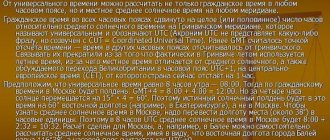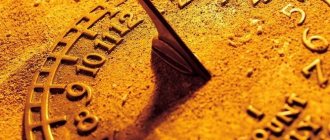Units of time.
It once seemed that there was nothing more stable for measuring time than the regular cycle of day and night. Every morning the sun rises in the east and sets in the west, a periodic phenomenon that was used to tell time during the day using sundials. The shadow cast by a long vertical object changed its length and direction, reflecting the course of the day. The sundial scale was divided into 12 divisions, each of which reflected an approximately equal period of the day - an hour . Why exactly 12? Nobody knows for sure; it was too long ago. However, the remarkable thing about the number 12 is that it can be divided into many different ways. For example, dividing by 2, we get the first and second half of the day, 6 hours each. Dividing by 3 we get morning, afternoon and evening - each period is 4 hours. 12 can be divided without a remainder by 4 and 6. The number 12 is much better for division than 10, which has only 2 and 5 divisors. To navigate time even more accurately, the hour had to be divided further. minutes and seconds appeared . And even for some time, fractions of a second were used - thirds, of which there were also 60 in a second. Why there were 60 of them is known quite reliably. The sexagesimal number system is one of the oldest on earth, and it was also very popular with ancient astronomers, who were the first to measure precise periods of time. This system has been successfully used for thousands of years. But by the time the second became too long to accurately measure short periods of time, the sexagesimal system had long gone out of fashion and was replaced by the decimal system. Therefore, milliseconds , microseconds and other smallest fractions of time are now measured in the decimal system.
You have a mistake!!!
From time to time we receive letters with the following content: “Your calculator calculated my card incorrectly!”, “On another calculator I have a different hour of birth!”, “Why does the hour of the Dragon not start at 7 am, yours is wrong!”, “They write me as a Dog, and I am a Pig”, “In my city it’s +4, but the calculator gives +3, this is wrong!” and so on.
Let's figure it out, are these errors or not?
Wrong year of birth?
This question is often asked by those born in January and early February. In Bazi, most Masters use a solar calendar, in which the beginning of the year ALWAYS falls on February 3-4. This means that everyone born BEFORE this date belongs to the animal of the previous year.
For example: 2021 was the year of the Pig, and 2021 is the year of the Rat. And everyone who was born in January 2021, as well as February 1–3, 2021, received a Pig in their bazi card in the year of birth. But after February 4 (the exact time can be found in the Chinese calendar), little Rats (Mice) began to be born.
Why do they think this is a mistake? Because on the Internet they often write about the beginning of the year according to the lunar calendar (the official new year in China); This date is floating, and most often falls in the interval from mid-January to mid-February. But we don’t use it to calculate Bazi!
If you are more experienced in Bazi and are looking for your date in a printed calendar, it is also easy to confuse the beginning of the month according to the lunar and solar calendars, especially since the Chinese calendar is lunisolar, that is, the column of the month most often begins with the first lunar day, and the solar beginning The month may even end up in a different column. You need to learn how to use a classic calendar, or take an adapted, solar-lunar one.
Wrong time of birth? Or In another calculator - another hour of birth!
Here we need to go a little deeper, the options for such discrepancies can be different:
- "China time" or local time?
If you read forums or books about the four pillars of fate, you have probably seen the sign:
And, of course, focusing on it, you expect to see the hour of the Dragon in the chart if you were born from 7 to 9 am, or the Dog if you were born from 19 to 21. But not everything is so simple.
Now it is customary to recalculate time to local time, taking into account longitude (by the way, even progressive Chinese Masters are beginning to use such recalculation). Therefore, it may turn out that a person was born at 8 am, but the hour of birth is not the Dragon, but the Rabbit or the Snake. Pay attention to the city of birth.
And this is correct if local time is used. And we recommend using it to calculate Bazi. If your Master taught you otherwise, simply do not check the “Local Solar Time” checkbox.
For advanced users: some consultants use True Solar Time, which also takes into account the change in the Earth's rotation speed throughout the year. It is also sometimes believed that latitude needs to be taken into account when calculating the duration of two-hour clocks (“rubber” clocks, variable hour branches), but in this case quite a lot of questions arise, especially for cities located beyond the Arctic Circle. If there are enough people interested, we will also include these possibilities in the calculator.
2.Place of birth
You have seen how critical it is to choose a city when it comes to local solar time. Therefore, an incorrect birth hour may appear if the city is not selected.
3.Daylight saving time and other time adjustments
If you manually calculate the hour of birth, do not forget that from time to time in cities they moved the time, changed time zones, introduced and canceled daylight saving time. All these changes are saved in the amendment databases. And if it is now +3 in your city, it is quite possible that at the time of your birth it was +4 and may result in a different pillar of the hour. To avoid searching for these changes, we have UTC Auto which determines UTC automatically depending on the year, date and time.
4 . It is important what calculation systems are used by the calculators on which you check the hour. In our memory, there are cases when the hour on another calculator was displayed incorrectly because:
- Only "Chinese time" was used, without adjustments
- “Curve” correction bases were used, with errors. For example, the Google database does not always take into account the history of time zone changes
- There were simply errors in the calculation algorithms
- Calculations were with true solar time or variable hour branches - always check which system is set
You can learn more about time in our free video Time Amendments.
When the time of birth falls on a change of year, season (month), day or hour, then in this case it is recommended to consider both versions of the chart.
Wrong month of birth?
This happens if you were born on the border of months. Typically, Chinese months begin from the 3rd to the 8th - the specific time of the shift must be looked at on the calendar. And if you are lucky enough to be born on the exact day when one month changed to another, you need to very carefully check the hour of birth and place of birth.
For example, a person was born on June 6, 1986. This is the day the month changes. For St. Petersburg, according to local solar time, the month changes at 3.44 am (attention - for another city the hour may be different!) This means that if the birth time is before 3.44, the month will be Snakes, and later – Horses.
Wrong birthday?
This happens especially often if a person was born at night, close to midnight. The fact is that it is at this time that the day changes. And here, too, there may be several discrepancies in the calculators, which may look like an error.
- It is important how to determine the beginning of the day
Some Masters use Late and Early Rat and the change of day in the middle of the hour of the Rat. Others believe that the day begins with the beginning of the hour of the Rat and there is only one Rat. We use two Rats, but if your Master taught you differently, check the Double Hour of the Rat checkbox.
Let's take the same June 6, 1986, St. Petersburg and the hour of birth 01.50.
If you use Early and Late Rat, the day changes at 01.58. Until 01.57 the previous day, the Dragon, begins, and at 01.58 the day of the Snake begins. This means that if you substitute the birth time of 01.50 into the calculator, you will get the day of the Dragon (after all, the day has not changed yet) and the hour of the Late Rat:
If you use a system with one hour of the Rat (check the Double Hour of the Rat checkbox), you will get the same hour (Yanskaya Earth on the Rat), but a different day - Snakes. Since according to this system the day began at 00.58. To the right of the map, where the clock is drawn, you can see the hour interval.
We check ourselves using the sign:
Read about the hour of the Rat.
2. Check the time!
Another problem with the day can arise if local time is set in one calculator, but not in another. The hour is different and so is the day. We are talking about the night time of birth.
In this case, also read the part of the article above about the “wrong” hour and time corrections.
If all of the above is not your case and you are sure that there is some error in the calculations, write to us in Feedback with all the data: date, time, place, link to the map in the calculator and what, in your opinion, is incorrect. Let's figure it out!
If you want to check a certain card, please write to Feedback:
- date with time and place
- link to the map here
- link to a map in another calculator, where the data is different
We also remind you: if you use our calculator, you don’t need to recalculate anything! You simply enter your birth details, gender and click “Calculate”. You can save the map.
Good luck with your Bazi research!
True solar time, Local Apparent Time (LAT)
The principle of operation of a sundial is based on the direction of the shadow cast by a vertical object - a gnomon . At noon, the shadow disappears or shows the direction strictly from north to south, the rest of the time the angle of the shadow gradually changes. By marking the sundial dial in a certain way, you can recognize the current time by the position of the gnomon's shadow. The oldest sundial, found in the Valley of the Kings, Egypt, dates back to the 13th century. BC. Even more ancient structures - the obelisks of Ancient Egypt (3rd millennium BC) are also considered the first gnomons that marked certain periods of the day. Local true solar time LAT is equal to the geocentric hour angle of the center of the visible disk of the Sun t, measured relative to the meridian of the observation site, plus 12 hours.
Mean solar time, Local Mean Time (LMT)
The sundial does not work in bad weather, when the sun is not visible, or at night. This cannot be said to have bothered most people millennia ago. They didn't have to get to university by 9:30 sharp or to work by 8:15. Active activity simply began no earlier than dawn and ended somewhere before sunset. Exact periods of time, regardless of the weather, were required to be measured exclusively by a narrow circle of people, such as astronomers. One of the most ancient such devices was a water clock, based on the principle of uniform flow or flow of liquid. Judging by the oldest find (a clepsydra from Karnaka, the era of Pharaoh Amenhotep III 1379–1342 BC), water clocks began to be used as long ago as sun clocks. The phrase “Time has expired” is well known, so this is directly related to the water clock. The clepsydra was a bowl with a narrow hole at the base, from which water gradually flowed out. By comparing the water level with marks on the inner surface, one could judge the elapsed time. In the 13th century AD, the first mechanical clocks appeared. The clock measured time regardless of the presence of the sun in the sky. However, clock adjustment for a long time was carried out according to the sun. Therefore, mechanical watches at that time showed local solar time. The first watches were not particularly accurate. But even from them it was possible to understand that noon, measured by mechanical clocks, on most days of the year does not coincide with noon, according to the sundial. The magnitude of the deviation of the time of noon measured by a uniformly running clock from noon by a sundial is not constant, it varies throughout the year and at a maximum can reach 16 minutes. The phenomenon was known to Hipparchus (2nd century BC). In order to distinguish the “floating” time shown by sundials from uniform time, it was necessary to give them separate names. The first is called true solar time , and the second is called mean solar time . In fact, mean solar time , which can now be accurately measured by any cheap watch, was impossible to measure with anything for a long time (until the advent of mechanical watches). Mean solar time could only be calculated using mathematical methods by knowing the equation of time. Mean solar time, LMT, the value of the equation of time at a given time EoT(t) and true solar time LAT are related by the following relation: The British Scientific Association in 1862 decided that “All scientists have agreed to use the second of mean solar time as the unit of time.” The definition of a second as 1/86400 of the average solar day has since taken root, entered the SGS and ISS systems of units of measurement and existed until the mid-20th century.
SunCalc - solar calculator
I would like to share with you a small but useful project that I developed in my spare time - the SunCalc solar calculator.
SunCalc shows on the map for the selected location and date the trajectory of the sun and the phases of illumination during the day (and a couple of other pleasant little things). The idea came about after I needed to find a good place in Crimea to shoot a shot of the sun going into the sea at sunset (for a video, they ended up shooting here) - it turned out that all the existing means for this were very outdated. I wanted to create my own, making it the best one imaginable, I found a good page with a bunch of astronomical formulas, started developing it in my free evenings, and this is the result.
Possibilities
- draws a beautiful vector graph on the map with the position of the sun at dawn, sunset and at the selected time (yellow, orange and red line), the projection of the trajectory of the sun (orange arc) and its spread throughout the year (yellow area around it); the closer the point on the graph is to the center of the circle, the higher the sun is above the horizon at that moment
- hovering the mouse over the sunset/dawn line shows the corresponding spread of positions
- shows illumination (darkness, twilight, daylight) in color on the time slider
- you can see the time not only of dawn and sunset, but also of 3 types of twilight (civil, navigation, astronomical) and complete darkness
- shows a link to the weekly weather forecast (cloudiness, precipitation, fog) for the selected location
- can determine location (click on the appropriate field -> Detect my location)
- the location can also be selected by search, autodetection, clicking on the map or dragging the marker
- Permalinks work for a specific place/time and back/forward in the browser
What can the ego be used for?
Firstly, in purely everyday situations.
How long before I need to leave the forest before anything is visible, if I still haven’t bought a headlight for my bike? How long can I sunbathe in the evening before the beach is covered by the shadow of the rock on the right? At what time will the sun no longer be blinding me when I go out to play football on the playground under my house? What is the lighting level of the apartment I am going to rent throughout the year? It has come in handy more than once in questions of this kind. Secondly, for photography lovers! Including me. It is often important to know, for example, when and how long twilight lasts (for night landscapes), in which direction the sun sets or from where it rises (to choose a good angle), what time to choose for a photo shoot of some object so that you do not have to photograph against the sun or it did not fall completely into the shadow of a neighboring building, etc.
Thirdly, for general education and satisfying natural curiosity. Why is Australia hotter in winter than in summer? What exactly are white nights and in which cities and when are they observed? What about polar day and night? How does the sun's trajectory change from north to south? How many minutes does dawn take from Moscow to Kyiv? Etc.
Some implementation details
- all application code runs on the browser side
- Google Maps API v3 is used for map and search
- for vector graphics on a map - Raphaël library
- to determine location - W3C Geolocation API, Google Gears or Google IP Geolocation
- jQuery and several jQuery UI components are used (Slider for time, Datepicker for date and Dialog for the welcome window)
- jQuery Address plugin is used for deep linking and ajax history
- between sessions the state is stored in cookies
- Wolfram Alpha was surprisingly the most suitable for weather forecasting
- for ideas for improvement, a page has been created on the UserIdea/Reformal service (which has already been covered by its authors on Habré)
What's planned for the future
- make a mobile version for iPhone and Android browsers
- add option to display time in local time zone
- add a slider for days of the year, similar to the time slider
- clean up and post the computational part of the code on Github
- write a good article for Habr about the nuances of developing such an application
I hope you will find a useful use for this little service. I will be very glad to hear your impressions and comments in the comments. You can also leave ideas or vote for those already expressed here. Thank you!
update:
Sorry for the problems with hosting, the project has temporarily moved to another server - now everything seems to be fine.
Standard (zone) time, Standard Time (ST), need for introduction
It is worth noting that when moving east by 1 degree, the sundial readings will be 4 minutes ahead of the readings at the current point: 24*60/360=4. Thus, a sundial shows the solar time for a specific longitude on Earth. If the longitude difference between two points is 15 degrees, the sundial readings will differ by one hour. Even after the invention of mechanical clocks that ran stably and evenly, for a long time all clocks in every city were set according to the sun, i.e. they displayed the average solar time for a given area. Thus, the greater the difference in longitude, the greater the difference in time in neighboring cities. When travel between cities was rare and leisurely, and the clocks were not so accurate, this did not cause any trouble. But with the development of rapid transport links, the problem has become serious. English railway companies were the first to realize the situation in the 40s of the 19th century - it was easier to adopt a uniform time throughout the country than to explain to each passenger that their clock needed to be adjusted immediately upon arrival in another city. Therefore, all clocks in the region began to be set according to a single London time, which corresponded to the mean solar time at the longitude of the Greenwich Observatory. The standard time for this meridian was called Greenwich Mean Time (GMT). Thus, the time throughout Britain became uniform and differed slightly from local solar time anywhere in the country, due to its small extent from west to east.
How to calculate true solar time for your area?
Posted by Tatyana Prokhorova on Saturday, November 3, 2012 · 78 Comments
In the Chinese Calendar, the day is divided into 12 equal parts of 2 hours each, and each is under the influence of a specific Earthly Branch. The day begins exactly in the middle of the hour (Rat). Therefore, this particular Chinese two-hour clock is divided in half into Late Rat and Early Rat:
To calculate the ba zi card, as well as for most actions related to feng shui and qi men dong jia, we need to convert civil time to true. The difference between civil and real time is mainly due to time zones that unite entire regions. Wherever the time zone is the same, noon occurs at the same time. Whereas noon in true (solar) time occurs at different times in different points of one region: to the east - earlier, to the west - later.
Thus, to calculate solar time, you will need the geographic coordinates of your locality, or rather, longitude. This information can be easily found on the Internet.
In one day, the Earth rotates 360° around its axis, which means that in 1 hour it travels 15° (360/24 = 15). It is at a distance of 15° from each other that the basic meridians that determine the UTC (universally coordinated time) time zones are located. The 0° meridian corresponds to the time zone UTC ± 0, the 15° meridian - UTC+1, the 30° meridian - UTC+2, and so on. If your locality is located directly on the meridian, then civil and real time will most likely coincide (although you need to check in any case, because in Russia often too large areas are united by one time zone!).
Let's determine how many minutes it takes the Earth to travel 1°. There are 24 hours in a day, and during this time our planet rotates 360°. There are 60 minutes in an hour, which means there are 24 x 60 = 1440 minutes in a day. Divide 1440 minutes by 360°, we get 4 minutes. It takes 4 minutes for the Earth to rotate 1°.
To calculate solar time, take the time zone in force in your city. For example, UTC+4 is currently in effect in Moscow. The meridian corresponding to UTC+4 is located at 60° east longitude. However, Moscow is located at 37°37′ east longitude.
Now we need to convert 37′ to degrees. It's simple: 1 degree is divided into 60 fractions, which are called "minutes." And each minute in turn contains 60 “seconds”. In order to convert the angle value indicated in the format (degrees minutes) into decimal fractions of a degree, you should add the number of minutes divided by 60 to the number of whole degrees (we will round the seconds, we do not need such precision).
So, divide 37′ by 60, we get 0.6167. Let's round up to 0.62. Moscow is located at 37.62° east longitude.
Let's find the difference between the longitude of the base meridian 60° and the longitude of Moscow:
37, 62° – 60° = -22,38° .
Moscow is located 22.38° west of the base meridian 60°. Let us multiply this difference by 4 minutes, during which the Earth moves 1°:
-22.38°x4 = -89.52 minutes.
Which is equal to 1 hour 29.56 minutes. That is 1 hour. 30 minutes, rounded up. This is the difference between civil (local) and true (solar) time in Moscow.
What time does the hour 巳 (Snake) begin in Moscow, for example? According to solar time, the hour 巳 is from 9:00 to 11:00. Moscow is located west of the base meridian, which means that the hour 巳 will begin there later than on the meridian itself. Later at 1 hour 30 minutes. (the difference between civil and solar time for Moscow, which we calculated above). That is, the hour 巳 in Moscow currently starts at approximately 10:30 and ends at 12:30 Moscow time. The next hour 午 (Horse) starts at 12:30 and ends at 14:30 Moscow time. And so on with all Chinese two-hour watches.
When the UTC+3 time zone was in effect in Moscow, we calculated the difference between the longitude of the base meridian 45° and the longitude of Moscow. This difference was equal to
37, 62° – 45° = -7, 38°.
Let's convert to minutes:
-7.34°x4 = -29.52 minutes.
That is, in Moscow, the Chinese two-hour periods started about 30 minutes later.
If the difference were with a + sign, it would mean that Moscow is located east of the meridian relative to which we determine the time zone. And the Chinese two-hour clock would start 30 minutes earlier, that is, the hour 巳 would start at 8:30 and end at 10:30 local time with a difference of +30 minutes.
Due to the irregular, elongated shape of the earth's orbit, the length of the day may differ at different times of the year. There are also calculation methods for this, but we will not consider them here. I simply advise that in the practice of Feng Shui and Qi Men, retreat from the boundaries of the Chinese two-hour clock for about 15 minutes in order to definitely get into the right one.
If after reading the article something remains unclear, write in the comments below. I will try to answer everyone to the best of my ability!
Tell your friends what you're reading:
RќСЂР°РІРёС‚СЃСЏ
Universal Time (UT)
In other countries there were proposals to choose their own meridians for counting standard time, but fortunately representatives of the scientific world of different countries were able to agree and chose the Greenwich meridian as the reference point for counting time everywhere. The World Meridian Conference, held in Washington to unify the prime meridian in 1884, chose the meridian of the Greenwich Observatory as the single prime meridian and recommended using time on the prime meridian as a single reference point for time wherever it would be convenient. The International Astronomical Union at the beginning of the 20th century proposed using the name Universal Time (UT) instead of the previously used Greenwich Mean Time, GMT, to designate the mean solar time at the prime meridian with the beginning of the day at midnight.
Ephemeris Time (ET)
Universal time is based on the rotation of the Earth. However, accurate astronomical observations have shown that the Earth's rotation is uneven due to changes in the angular velocity of rotation and the movement of the pole (change in the position of the rotation axis). As a new, more accurate time scale, it was proposed to use a scale based on the periodic motion of bodies in the Solar System. This scale is called ephemeris time (ET). Accordingly, the new definition of the 1952 second was as follows: 1/31,556,925.9747 fraction of the tropical year for January 1, 1900 at 12 o'clock ephemeris time. Ephemeris time can be expressed in terms of universal time as follows: ΔT values are given in astronomical yearbooks.
LiveInternetLiveInternet
What is time. Daily regime. Torsunov O.G.
Timeliness is needed for the birth of a child, ripening tomatoes, a morning jog, a conversation with the boss….
Time is the MAIN factor of the three main ones: Time, Place, Circumstance . Now, during Kali Yuga, life expectancy should be 120 years .
Time is a punishing force, time is a happiness-giving force. All the forces in the universe give the benefit of performing certain actions at a certain time. This lecture discusses the forces of the Sun and Moon.
The moon is active from 4 pm to 9 am.
Sun from 4 am to 9 pm.
The sun crosses the equator - throughout the hemisphere the sun begins to influence its energies from 4 am.
Time is an aspect of God and acts cyclically on all things and factors, moving them towards destruction. Time is all-pervasive and is divided into three parts: past, present, future. And the past is in now and the future is in now. The past is a memory, a memory. The future can be known in the now if you have a sinless, pure consciousness.
The only way not to be punished by time is to live with the times. This is a necessary element to live a happy life. Time punishes harshly.
Explained using the example of a daily routine:
If a person follows the daily routine in the morning, a happy childhood is ensured in the next life. If a person follows the daily routine during the day, a happy youth is ensured in the next life. If a person follows the daily routine in the evening, a happy old age is ensured in the next life.
Every day is an exam for our future life, every day is a small life.
Getting up late - suffering in childhood Going to bed late - suffering in old age Being lazy and doing nothing during the day - suffering in youth
2 aspects of time influencing consciousness: commanding and punishing .
The Commander puts a person within the framework of reasonableness - timely completion of all tasks: sleep, birth of a child, etc. There are limits to life; a person who understands this is happy, but a person who does not understand it suffers. He who does not understand - does not listen to the commanding aspect, falls under the influence of the punishing aspect.
Blessings of Understanding Time:
1. A person does not expect a happy future - he knows that the future brings death closer and seeks happiness in the now. 2. 50% of diseases are cured by a daily routine. 3. Knows in advance the approach of his death (a few days - a month in advance)
Symptoms of imminent death: 1. Loss of interest in life 2. Dull perception of the world 3. Food is tasteless 4. A feeling of the inevitability of something 5. The desire to repent of everything 6. An understanding of eternity comes + secondary signs: the nose becomes sharper, the body becomes alien, there is no facial expression
However, the soul feels that everything will not stop, that the soul lives forever, simply changing bodies: every life and every day.
Time of birth of a person: from noon to midnight - wants to go to bed late - did not follow a daily routine in a previous life - becomes a night owl from midnight to noon - blessed by time - easily gets up early all life - becomes a morning person
_Timely sleep:
from 9 pm to 11-12 o'clock at night the mind rests - only in these two hours. mental fatigue accumulates over the years. manifests itself through the eyes. nothing makes a person happy, a desire to die appears, there is no higher goal, no desire to achieve happiness. Fatigue accumulates and then the rhythm of all organs, including the heart, suffers. There is nervous tension, a desire to smoke, drink coffee, nervousness and strong irritability. Then diseases: the immune system, etc., anger at the whole world, etc. from 11 to 1 am - restoration of vital energy. from 1 to 3 am - emotional strength is restored.
From 9 pm the power of the Moon prevails over the power of the Sun. The moon cools the mind and allows you to accumulate psychic energy. The sun allows you to waste energy. Therefore, sleeping during the day does not allow you to rest.
A sign of holiness is that a person can sleep for three hours and feel good and cheerful all day. Symptoms of the punishment of time are listed in fatigue of the mind. You need to sleep 8-9 hours at 14 years old, 6-7-8 hours in adulthood, 5-6 hours in old age
Morning rise:
from 3 a.m. to 4 a.m. you can only engage in spiritual practices; only highly spiritual people can get up at this time; the rest will lose their health. from 4 am to 5 am : a person is able to lead people, is capable of being a very advanced person, very cheerful, is able to overcome himself, all the difficulties in life and achieve great success and in the material field from 5 to 6 am to get up - a person at least he will achieve his goal in life, there will not be very big problems, he will not get very sick, but he will not achieve anything deep in life. from 6 to 7 am - the train left, and nothing good
The first roosters are at three in the morning, the second at 4, the third at five. the fourth is after six and means “the train has left”
Three types of solar energy: 1. quanta of the sun (solar heat felt by the skin) 2. primary element of fire - penetrates inside, causes digestive fire, affects the subtle bodies, enhances the activity of the mind. maximum at 12 noon. 3. joy, optimism. accepted only by those who get up early , that is, on time. proof: birds singing from 4 to 6 am.
Those who get up from 6 to 7 lose their vigor and tone, feel that they constantly do not have time and are late. Those who get up from 8 to 9 - constant chronic diseases, lethargy, nausea, mental weakness, lack of confidence in their strength. They cannot live without coffee, are hyper or hypotensive, and are prone to accidents.
Getting up from 9 am means premature death is possible.
The deadline for lunch is 3 p.m.
A person who gets up late is unable to perceive the truth.
A person who gets up after 6 am cannot change his life and karma. This is impossible, because the strength for this is given by the sun through optimism only at 4-6 in the morning. A morning shower—chilling, invigorating—is a must, and a must-do. with your head so that the subtle body of the mind is cleansed and then 60-70% of depression will go away.
Nutrition:
first breakfast - from 6 to 7 am , suction occurs under the stomach, the psyche is excited, the wind rises in nature. Morning is a time of happiness and you need to eat foods that support goodness: all fruits, especially dates, bananas, figs, mangoes, berries, cherries, plums, as well as nuts and sweet foods, honey, even sugar. drink kefir (recipe given). sweet spices: cinnamon, cardamom, barberry, fennel, cumin, anise. cereal: buckwheat. Observe this and you will be a happy person, you will enjoy every day, you will be healthy. A person wants to rejoice and laugh after such a breakfast.
Grain food is intended to give strength to the mind, but it also requires a lot of fire for digestion and, if eaten at the wrong time, takes away energy even from the mind. Therefore, eat grain foods only at noon. Strength of mind - to communicate with people, to defend your opinion, mental strength. Normal digestion of food takes 6 hours. active digestion begins at 11 am. Therefore, if food enters the stomach after 12, then digestion will occur too late and hunger will occur before 6 pm. if before 12 noon, hunger does not occur until the evening. Therefore, lunch at two o’clock in the afternoon is work on the toilet, food is not digested.
Lunch is at 11-12 - and then digestion occurs until 7 pm, while vitamins are absorbed from 6 to 7 pm and you don’t feel like eating . From 6 pm you can eat vegetables that grow above the ground, except tomatoes. Underground vegetables are associated not only with the energy of the Moon but also with the energy of the Earth, so it is better to eat them at lunch or from 6 to 7. After 9 pm it is good to drink milk.
Activity:
Before 6 am, it is best to engage in spiritual practices and meditation. It is best to read the prayer before 5 am. For atheists, the easiest way is to read the prayer “to wish everyone happiness,” which can be combined with any other activity (deeds for the happiness of all beings). 6 to 7 am is the best time for remembering and remembering. The Sun gives sharpness to memory, and the Moon gives duration. At this time, the Sun and Moon are in harmony. The best time to experience what you remember is between 7 and 8 am. Active exercise is best done from 7 to 9 am . Logical thinking works from 8 to 9 am. From 9 to 10 am it is easy to work with statistics and documents. From 10 to 11 am, intellectual abilities drop and at this time you need to scroll through something, learn figuratively, browse, do management, answer letters. At 11 am the learning process ends . sits down well for dinner. Lunch: grains, legumes, vegetables. If you fry it, use melted butter. From 12 noon to 6 pm is the time for active physical (production) or mental work (management, business). From 6 pm a person should retire from work and start listening or watching something pleasant. Talk about pleasant topics, read.
In the morning the mind works three times faster than in the evening. At night, only a warm shower (cool in the morning). Three settings a day: 5-40 minutes of wishing everyone happiness three times a day. to 5 am, before lunch, in the evening before bed. When the sun sets, it is time for desecration: it is better not to eat, not to conceive children, not to solve important matters.
Brief lecture notes. Taken here
duration 2 hours 20 minutes. (lecture taken from https://www.torsunov.ru/mp3.htm).
!!! I recommend listening to those who consider this topic of little importance. !!!
Series of messages “Torsunov O.G.”:
Part 1 - About joy and health. Part 2 - Torsunov O.G. Laws of the Universe... Part 11 - Torsunov O.G. Diagnostics of prana. Part 12 - Torsunov O.G. The secret of male and female nature Part 13 - Torsunov O.G. What is time. Daily regime. Part 14 - Torsunov O.G. Treatment with precious stones. Ayurveda. Part 1. Part 15 - Torsunov O.G. Treatment with precious stones. Ayurveda. Part 2. ... Part 25 - Laws of morality. Torsunov O.G. Part 26 - Ayurveda. Nutrition and health. Part 27 - False ego. O.G. Torsunov.
Series of messages “All about Time!”:
Part 1 - About joy and health. Part 2 - Daily biorhythms in human life... Part 11 - Encyclopedia of Symbols. Part 4 Part 12 - History of European costume. Part 13 - Torsunov O.G. What is time. Daily regime. Part 14 - The Magic of Numbers. Part 15 - Social life of the 19th-20th centuries in Russia. ... Part 33 - Time and information. Part 34 - Lilya Brik. Part 35 - The magic of completed gestalts.
International Atomic Time (TAI)
With the invention of atomic clocks, humanity received the most stable way to measure time. Since 1967, we have moved from ephemeris time to time measured by atomic clocks. They tried to make the second of atomic time exactly the same length as in the ephemeris scale, but expressed its definition in other terms: A second is a time equal to 9,192,631,770 periods of radiation corresponding to the transition between two hyperfine levels of the ground state of the cesium-133 atom. On January 1, 1958, atomic time corresponded to universal time. At this moment, the shift in ephemeris time (ET) was 32.184 s to universal time. Accordingly, TAI is expressed through ET as follows:
Coordinated Universal Time (UTC)
The traditional method of measuring time by the rotation of the Earth is familiar to everyone, but is not stable due to the uneven rotation of the Earth. Atomic time is stable, but after years it noticeably diverges from universal time. In order to obtain a stable time tied to the change of day and night on Earth, they decided to create a scale, the unit of which would be the stable atomic second, but occasionally the 61st second would be added (or the 60th would be removed), so that the difference between this time and the universal did not exceed 0.9 seconds. The time is called universal coordinated UTC. The International Earth Rotation Service (IEO) publishes daily the difference between Universal Time and Coordinated Time ΔUT, as well as a list and dates for the introduction of leap seconds. There are several versions of universal time. The WSWS publishes the difference ΔUT1 between UT1 and UTC. UT1 is currently the main version of universal time, the value of which is determined from distant quasars using very long baseline radio interferometry (VLBI). Accordingly, other versions of universal time have almost fallen out of use: UT0 and UT2. UT0 was the original UT based on observations at a specific observatory. UT0 does not take into account the effect of pole shift, which means that different observing stations will receive different values. Since the 80s of the last century, the UT0 value has ceased to be monitored by all observatories. In our calculator, the value of UT0 is derived from the relation: UT1= UT0−(xp sin λ + yp cos λ ) tan ϕ where xp, yp are the coordinates of the instantaneous pole relative to the conventional international origin, ϕ, λ are the coordinates of the observation point UT2 is universal time without taking into account seasonal annual fluctuations in the rotation of the Earth. Calculated by the formula: UT2 = UT1+0.0220 sin2πθ − 0.0120 cos 2πθ − 0.0060 sin 4πθ + 0.0070 cos 4πθ, where θ = 2000.0+ (JD − 2451544, 533)/365, 2422, JD—Julian date of observation











